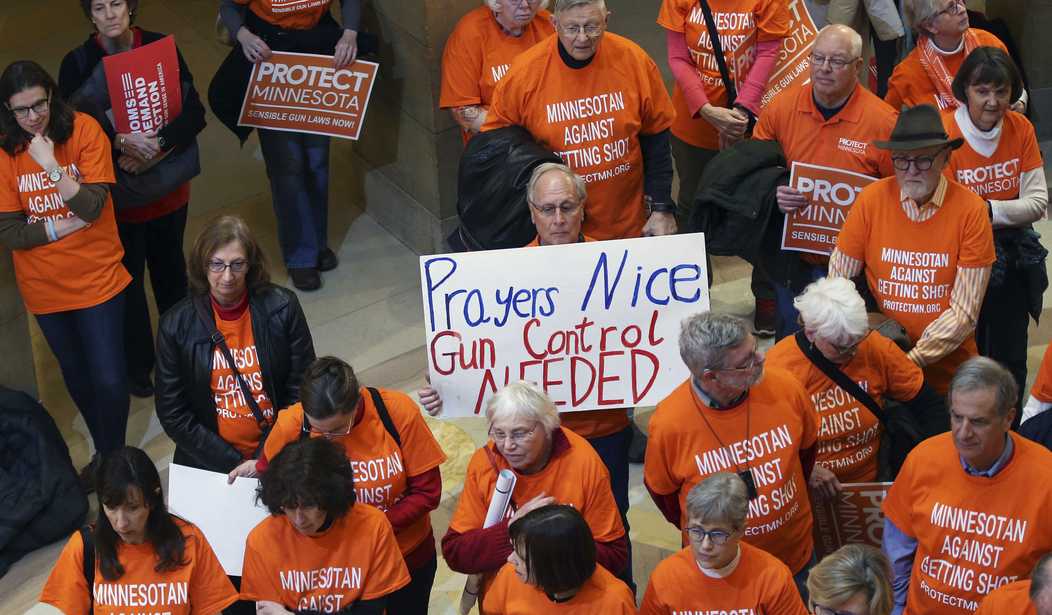A new study that claims a majority of Americans "experience some form of gun violence in person" is generating a lot of headlines, but not a lot of critical thinking to go along with them.
The study comes from Daniel Semenza, who's the director of research at the New Jersey Gun Violence Research Center and an associate professor at Rutgers University, and according to his research about 2/3rds of Americans have "directly" experienced gun violence in some form or fashion over the course of their lives. That's a pretty staggering number, but how did Semenza reach that conclusion? By broadening the definition of both "gun violence" and "direct experience" to the point of absurdity.
Ever hear a gunshot in your neighborhood? Well then, you've directly experienced "gun violence". Have you known anyone who took their own life with a gun? You too have directly experienced gun violence. In fact, Semenza came up with six separate categories of "gun violence" and asked survey respondents if any applied to them:
1) known someone personally who died by suicide with a firearm
2) been threatened with a firearm by another person
3) been intentionally shot with a firearm by another person
4) personally known someone, like a family member or friend, who had been shot on purpose by another person with a firearm
5) personally witnessed a shooting in the neighborhood where they lived at the time
6) heard gun shots in the neighborhood where you lived at the time
As you can imagine, the most common form of "gun violence" experienced by Semenza's subjects was hearing gunfire in the neighborhood where they lived at the time, with nearly half of survey respondents asserting that's happened to them.
Is that really "gun violence", though? In some cases respondents may very well have heard the sound of a gun fired in anger, revenge, or as part of a crime of opportunity. But where I live, the sound of gun shots is routine, and it generally involves someone who's hunting, sighting in their rifle, target shooting, or taking out a four-legged threat to livestock.
That begs the question; if merely hearing a gun fired is considered experiencing "gun violence", then does Semenza believe that actually firing a gun outside of a shooting range is an act of gun violence? Did I commit an act of "gun violence" when I shot the raccoons who were obliterating my flock of chickens last summer? What about when I last went plinking at my favorite shooting spot on my property?
I know several people who have taken their own lives with a firearm. I also know several people who have taken their own lives by other means. I don't consider the method of their death nearly as important as the fact that they ended their own lives, but apparently for Semenza it's the means that matters most.
Pointing to his findings, Semenza says "[t]his is a public health crisis hiding in plain sight," adding that "[g]un violence exposure isn't just about being a victim. It touches people through what they see, hear and experience, especially in Black and Hispanic communities. These exposures accumulate and damage health over time."
Semenza and other anti-gun researchers have a vested interest in treating violent crime, suicide, negligent shootings, and yes, even lawful activities involving firearms as a public health emergency. Under the Biden administration hundreds of millions of dollars were funneled to researchers like himself, with the tacit understanding that the research they conducted would come replete with conclusions that demanded gun control-centric "solutions".
Treating suicide the same as a drive-by shooting, however, is a terrible way to address both of those distinct and separate issues. Reducing suicide may involve gun-centric measures like voluntary off-site storage options, but a robust mental health system and eradicating the stigma around mental health treatment is by far the most important steps we can take to save folks from self-harm. Reducing violent crime not only depends on a functional criminal justice system that provides consequences to violent criminals, but helping high-risk individuals find a path away from a life of crime if they choose. None of those steps require enacting more gun control laws or treating the right to keep and bear arms as a crisis that needs to be addressed or a problem that must be solved, and they certainly don't require defining "gun violence" as broadly as Semenza has done.









